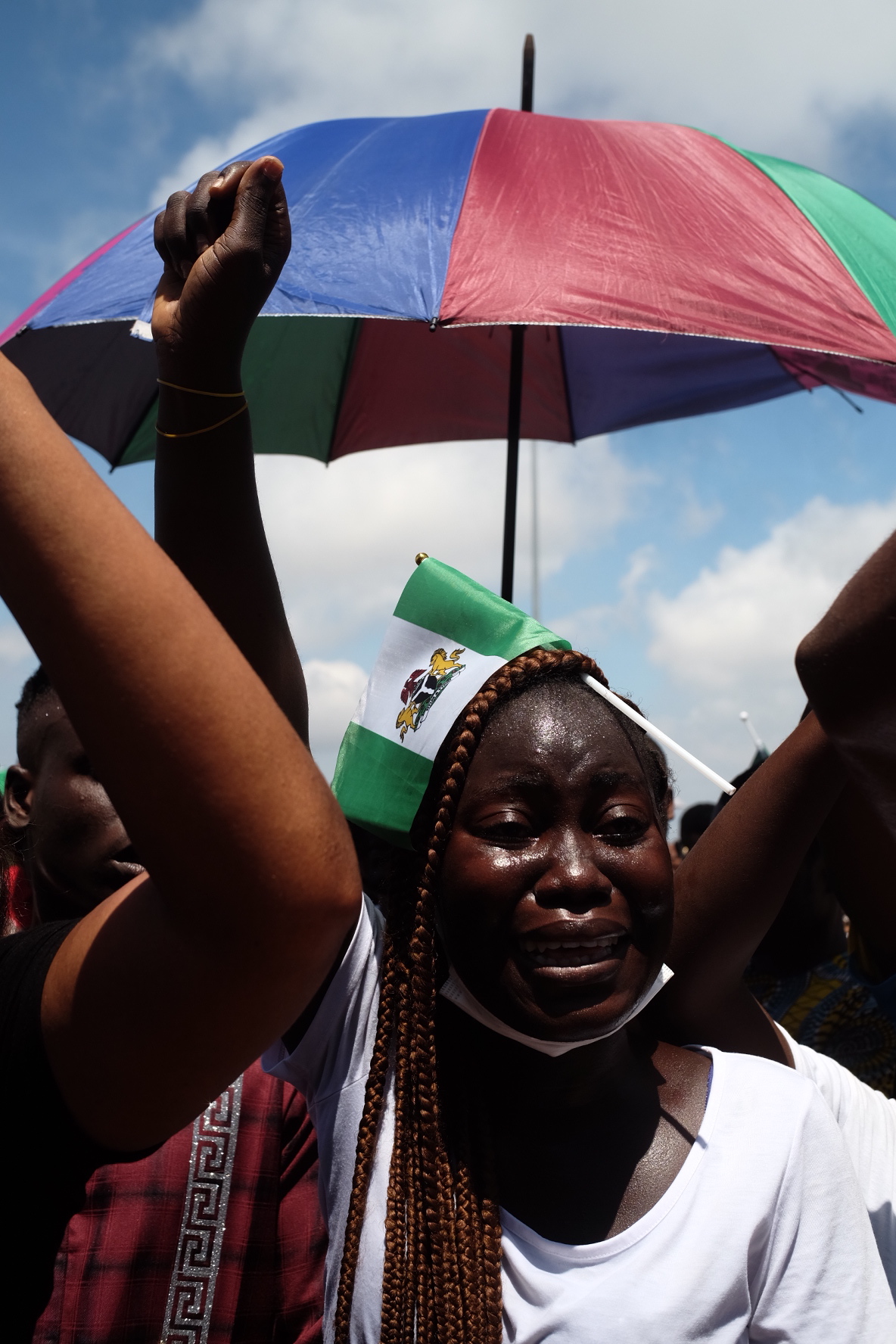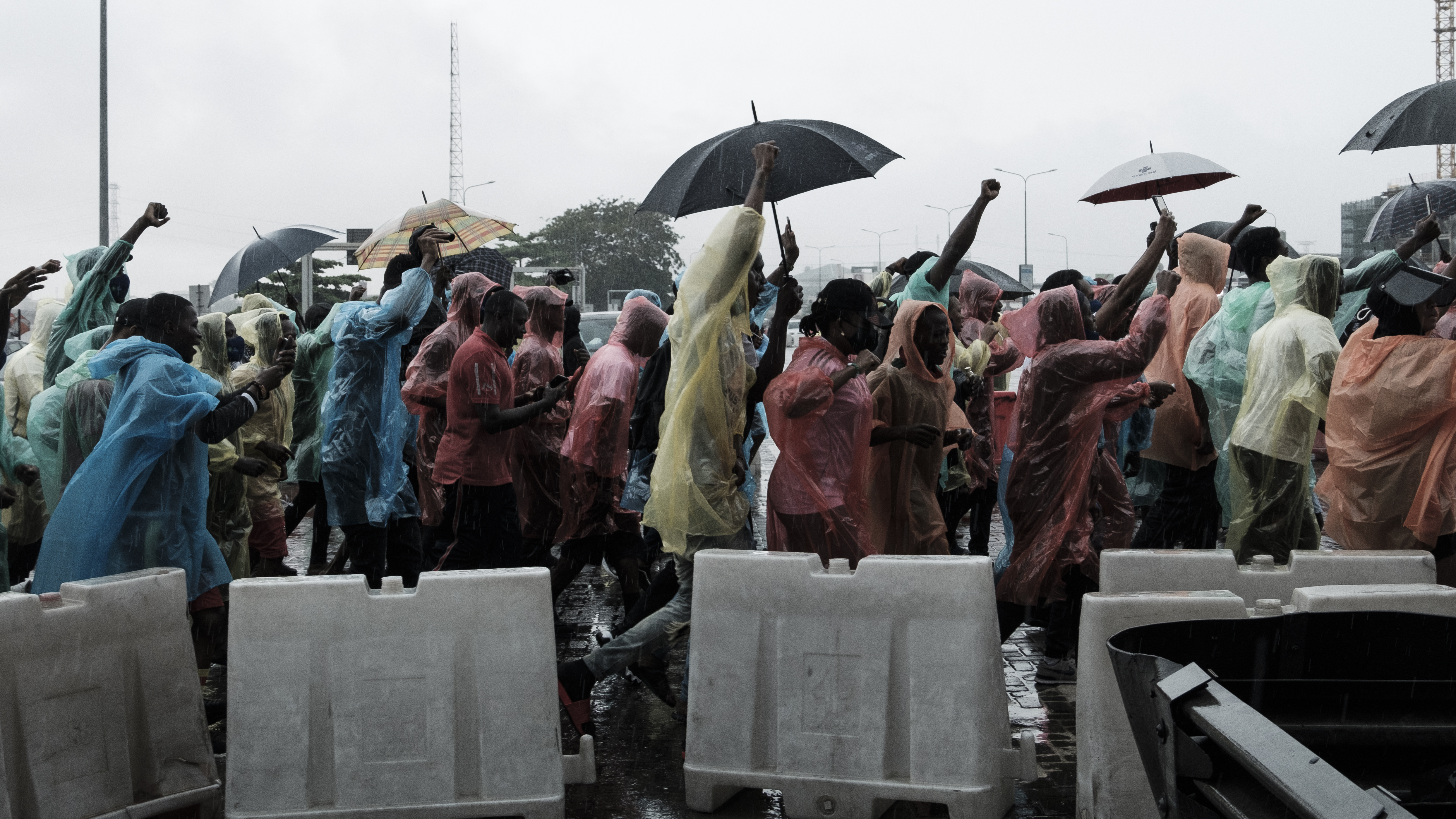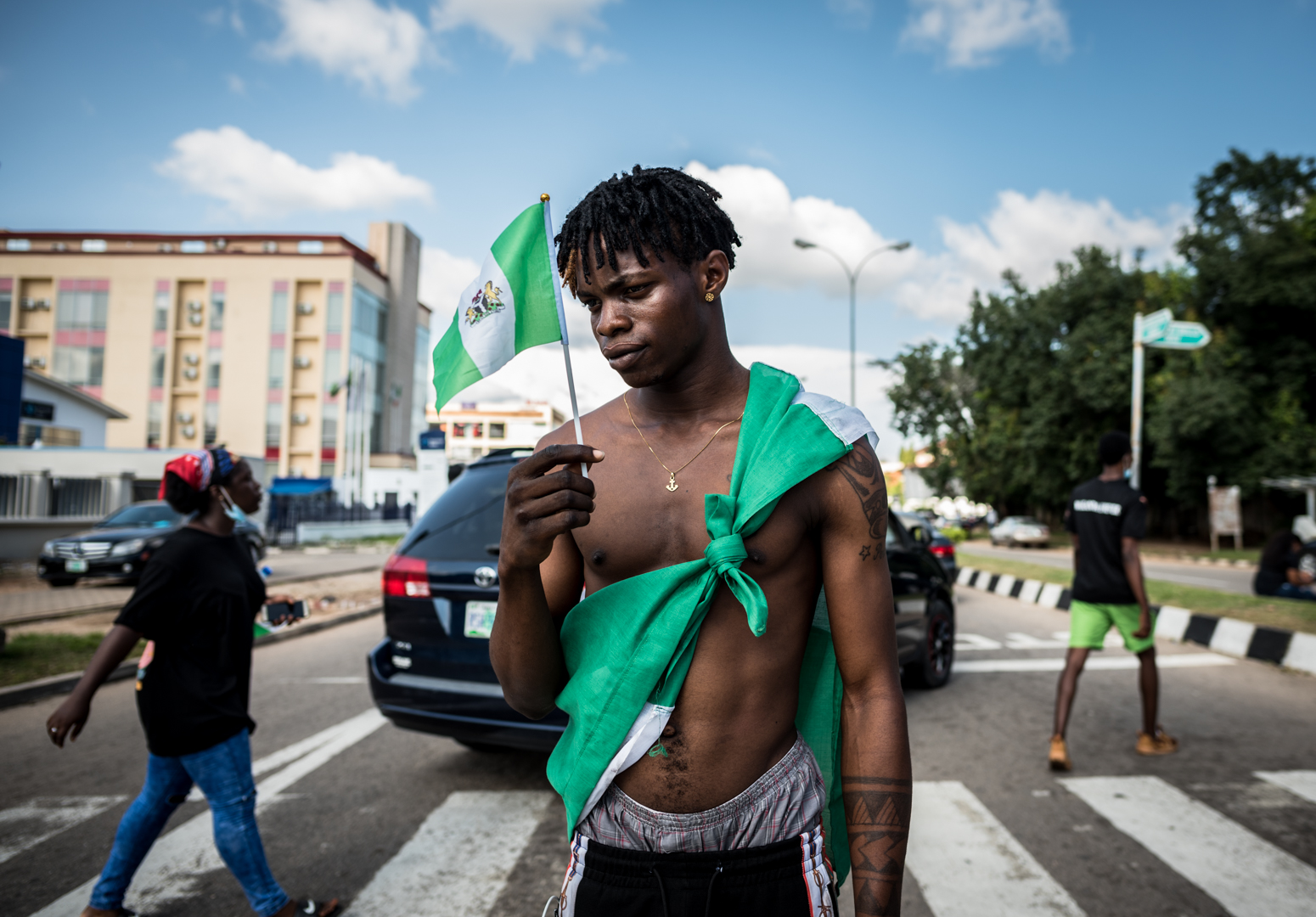NEW NIGERIA STUDIOS
Words by Helen Jennings
24 November 2020
As media partner for ART X Lagos 2020, Nataal profiles four of the End SARS photographers being supported by the fair
When Nigerians took to the streets across the country in October to protest against police brutality and demand that the Special Anti-Robbery Squad be disbanded, a sense of empowerment was felt and shared among young Nigerians everywhere. #EndSARS went viral while it was announced that SARS would indeed be dissolved. The unlawful acts of violence and repression that followed, including the Lekki Toll Gate massacre that saw army forces kill at least 12 people, has not stopped this youth-led movement which continues to call for real and sustained change.
ART X Lagos stepped up during the protests to offer support to several photographers documenting this moment in history from the front line. And now some of their key works will be exhibited as the special project New Nigeria Studios at the rescheduled digital edition of the art fair from 2 to 9 December 2020.
“We share a vision for Nigeria’s future in which everyone can realise their fullest potential, and remain committed to providing platforms for expression, upliftment and inspiration,” says ART X Lagos founder and director Tokini Peterside. “Our fifth edition art fair will create a space where we can come together to contemplate society’s shared demands and expectations for tomorrow, and meditate on new ideas for how our global community might move forward as one… We will continue to work to amplify these important artists’ voices in the coming weeks, and champion the art and creativity that contributes tangibly to the movement for a New Nigeria.”
As a media partner for ART X Lagos, Nataal speaks to four of these brave photographers about their important contribution to End SARS and the story behind one of their images.
ART X Lagos stepped up during the protests to offer support to several photographers documenting this moment in history from the front line. And now some of their key works will be exhibited as the special project New Nigeria Studios at the rescheduled digital edition of the art fair from 2 to 9 December 2020.
“We share a vision for Nigeria’s future in which everyone can realise their fullest potential, and remain committed to providing platforms for expression, upliftment and inspiration,” says ART X Lagos founder and director Tokini Peterside. “Our fifth edition art fair will create a space where we can come together to contemplate society’s shared demands and expectations for tomorrow, and meditate on new ideas for how our global community might move forward as one… We will continue to work to amplify these important artists’ voices in the coming weeks, and champion the art and creativity that contributes tangibly to the movement for a New Nigeria.”
As a media partner for ART X Lagos, Nataal speaks to four of these brave photographers about their important contribution to End SARS and the story behind one of their images.
ANTHONY OBAYOMI
This photographer and filmmaker studied Visual Arts at the University of Lagos and won the LagosPhoto National Geographic Prize 2017. The following year he was selected for Electric South’s New Dimensions Lab in Cape Town and has gone on to receive the Taurus Prize for Visual Arts 2019/2020.

Q:
Please tell us about this image.A:
It was shot on the 13 October when the End SARS protesters at Alausa (the Lagos State administrative seat of power and home to the Lagos State House of Assembly) marched to the nearby Lagos-Ibadan expressway, the highway that connects Lagos to the rest of South-Western Nigeria, and mounted a road block that disrupted activities for several hours. This image documents a feeling of triumph at one of the peak moments of the protest. The young people I documented seemed powerful and in control of their lives and country.Q:
Why was it important for you to document the protests?A:
For me, it was more than just another assignment. As a young Nigerian, I was excited to record history being made by my generation. For many of us, it was a first attempt at political activity and a chance to have our voices heard. The protests were made possible by young people contributing the best of their skills and ideas. My photography was my most useful contribution and has proved useful in fighting gas-lighting attempts and fake news that tried to discredit the protests after the Lekki massacre.Q:
How would you describe your wider photographic practice?A:
I explore lens-based arts and storytelling techniques that combine art and technology in digital, traditional, immersive and experimental media. My work is mostly in the form of documentaries that offer alternative perspectives by presenting information about people, society and culture in ways that help speak to social justice, balance out stereotypes and question traditional opinions. My aim is to foster tolerance among different people and communities.Q:
Where do you hope your photography will take you in future?A:
I hope that my work will be a meaningful contribution to the promotion of African storytelling and spark important conversations that help to change culture, both here at home and around the world.Visit Anthony Obayomi
UGOCHUKWU EMEBIRIODO
Ugochukwu Emebiriodo hails from Lagos. He studied English and Literary Studies at the University of Port Harcourt and now balances photography with his role as junior curator at African Artists' Foundation.

Q:
Please tell us about this image.A:
It was shot on 18 October at the Lekki Toll Gate during a church service at the protest ground. The photograph shows the thirst for change.Q:
Why was it important for you to document the protests?A:
Creatives are often tagged fraudster and constantly fall victims to police extortion and brutality because they dress differently or are able to stay indoors and make money, so they mark you. I'm not an observer for this one, I'm just a protester who happens to have a camera.Q:
How would you describe your wider photographic practice?A:
I like to think of myself as a travel, street and documentary photographer, more-so travel more than anything else. The opportunity to go somewhere new and create photographs is the original reason I started out.Q:
Where do you hope your photography will take you in future?A:
The very top. I hope to win the Pulitzer Prize some day and maybe work for Time magazine.Visit Ugochukwu Emebiriodo
IFEBUSOLA SHOTUNDE
Ifebusola Shotunde grew up in Lagos and works both as a photographer and graphic designer. He aims to candidly document the city life of Nigeria and has been exhibited at NNN/PPP at 16/16, the British Council Arts Festival and last year’s ART X Lagos.

Q:
Please tell us about this image.A:
This photograph was taken at the Lekki Toll Gate on a rainy morning during the protests. For me it tells a story of the power of unity and the strength that comes with the accumulation of positive energy. It shows Nigerians in raincoats (which were donated to the protesters by a supporter) chanting “End SARS” in the rain. It shows that there is an energy that can be harnessed towards bringing a change that can either result to better governance or put an end to bad governance in Nigeria.Q:
Why was it important for you to document the protests?A:
I have been a regular victim of wrongful profiling and harassment by the Nigerian police and I was delighted to see young Nigerians like myself come out to protest for police reforms. It felt like a celebration of diversity and a plea to the government to put an end to the harassment and killings. I wanted the world to be aware of what was happening and the best way I could do that was through sharing images and videos from the protests.Q:
How would you describe your wider photographic practice?A:
My practice entails documenting the people and places I encounter on my life's journey while discussing the ills of society and the beauty of life.Q:
Where do you hope your photography will take you in future?A:
I hope it enables me to travel through Nigeria, explore her culture and promote unity by telling stories that educate people on the importance of human connections and show that everyone really just wants peace.Visit Ifebusola Shotunde
ETINOSA YVONNE
Abuja-based Etinosa Yvonne dedicates her work to addressing social injustice. She is one of six artists selected for this year’s World Press Photo 6*6 Africa Talent for her series It’s All In My Head, which explores the trauma felt by victims of terrorism and conflict in Nigeria. The same series has also received recognition from LagosPhoto, Africa Media Works and Women Photograph.

Q:
Please tell us about this image.A:
I photographed this protester in Abuja. The protests birthed a set of fearless millennials who are willing to fix Nigerian society, which is largely dysfunctional. It was both liberating and uplifting to encounter young protesters that see past all manner of fear, sentiments and bigotry that our rulers and the older generation have used to keep us divided.Q:
Why was it important for you to document the protests?A:
As a concerned Nigerian who is constantly seeking ways to contribute my quota to improving my society, it was necessary that I document such a historic movement. In a country where injustice reigns, I saw the protest as an avenue to bring to the fore one of several human rights challenges that Nigerians are confronted with.Q:
How would you describe your wider photographic practice?A:
The primary focus of my work is on exploring and expressing themes related to the human condition. While I am currently a lens-based practitioner, I am looking to explore other mediums in the near future.Visit Etinosa Yvonne
This article was originally published on Nataal.com on 24 November 2020, and republished in partnership with ART X Collective on ARTXLAGOS.COM
Visit ARTXLAGOS.COM/New-Nigeria-Studios for the full exhibition of works.
Visit ARTXLAGOS.COM/New-Nigeria-Studios for the full exhibition of works.
